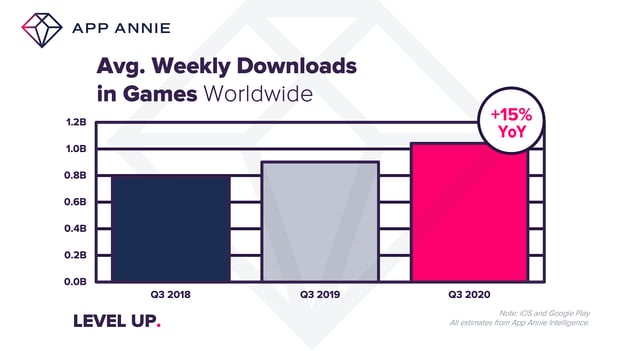With the newest gaming consoles in short supply, mobile gaming statistics continue to break records as consumers look for new ways to stay entertained and connected during the current health crisis. App Annie reported weekly downloads in Q3 2020 for mobile games across the app stores averaged 1 billion for the second straight quarter, an increase of 15% when compared to the same time in the previous year.
Average Weekly Downloads

In addition to record downloads, consumers spent record amounts of money on mobile gaming apps, with over $20 billion in purchases made through app stores in Q3 of 2020, the largest quarter ever. With the anticipated year-end surge associated with the holidays, experts predict 2020 will close out with mobile gaming revenue of over $174.9 billion, an increase of over 19% from 2019.
As gamers seek to distinguish themselves competing with others, bad actors have been quick to take notice of their aspirations and these trends and are looking to cash-in. Malicious actors often target gamers, offering “cheats”, unauthorized modifications, in-game, and social currency boosts. Many of these third-party feature “enhancements” also include a number of undesirable side-effects including malware or the theft of personal data.
Ensuring the safety of your consumers and the authenticity of their experience with your mobile gaming and other apps is critical. Rogue apps and misleading activity masquerading as your brand not only puts your customers' safety and security at risk, but can lead to long-term damage to your brand. With more people relying on mobile apps these days, it's more important than ever to have a strong mobile apps component in your overall brand protection strategy.
For more information on how to plan an effective mobile app enforcement program to compliment your overall mobile strategy, we've published an informative guide that you can download here.